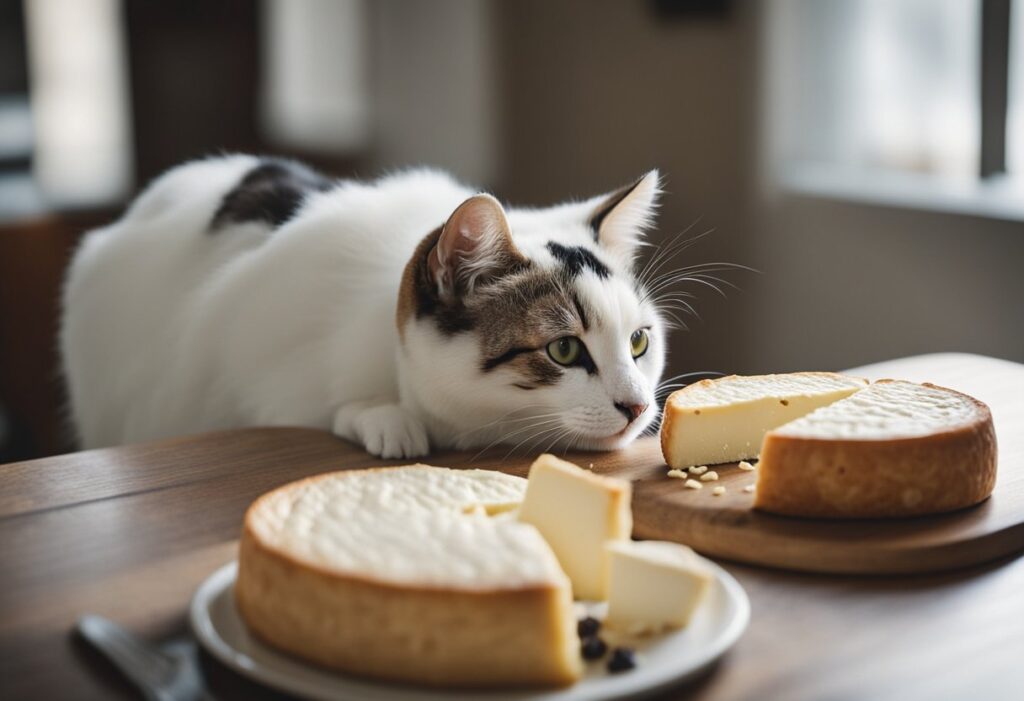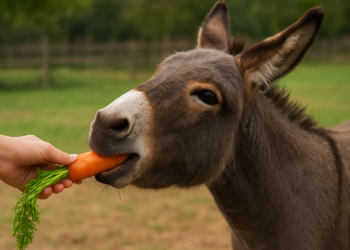Cats are known for being picky eaters, and as pet owners, it’s our responsibility to make sure that the food we give them is both safe and nutritious. One food that many cat owners may wonder about is goat cheese. Can cats eat goat cheese?

The short answer is that it depends. While some cats may be able to tolerate goat cheese without any issues, others may experience digestive problems or even an allergic reaction. It’s important to keep in mind that just because a food is safe for humans to eat doesn’t necessarily mean it’s safe for cats.
If you’re considering giving your cat goat cheese, it’s important to do so in moderation and to monitor your cat’s reaction closely. In the following paragraphs, we’ll take a closer look at the potential benefits and risks of feeding your cat goat cheese, as well as some alternative treats that your cat may enjoy.
Can Cats Eat Goat Cheese?

Goat cheese is a popular type of cheese that is enjoyed by many people. However, when it comes to feeding it to our feline friends, we need to be cautious.
While cats can eat certain types of cheese in moderation, it is important to note that not all types of cheese are safe for cats to consume. Goat cheese, in particular, can be problematic for cats.
Goat cheese is high in fat, which can lead to obesity and other health issues in cats. Additionally, some cats may be lactose intolerant, which means that consuming goat cheese could cause digestive problems such as diarrhea.
If you do decide to feed your cat goat cheese, it is important to do so in moderation and only as an occasional treat. It is also recommended to consult with your veterinarian before introducing any new foods to your cat’s diet.
In summary, while goat cheese may seem like a tasty treat for your cat, it is best to err on the side of caution and avoid feeding it to them regularly.
Understanding Cats’ Dietary Needs
Cats have unique dietary needs that are different from other animals. As obligate carnivores, cats require a diet that is high in protein and fat, with minimal carbohydrates. They also require specific nutrients, such as taurine and arachidonic acid, which are only found in animal-based foods.
Carnivorous Nature of Cats
Cats are natural hunters and predators, and their digestive systems have evolved to process a diet that is high in animal protein. In the wild, cats primarily eat small prey, such as mice, birds, and insects. These prey items are high in protein and fat, and provide the nutrients that cats need to thrive.
Lactose Intolerance in Cats
While cats are able to digest lactose as kittens, many cats become lactose intolerant as they mature. This means that they are unable to digest lactose, which is a sugar found in milk and dairy products. Feeding cats dairy products, such as goat cheese, can lead to digestive upset, including diarrhea and vomiting.
In conclusion, it is important to understand the unique dietary needs of cats in order to provide them with a healthy and balanced diet. As obligate carnivores, cats require a diet that is high in animal protein and fat, with minimal carbohydrates. Additionally, many cats are lactose intolerant and should not be fed dairy products, such as goat cheese.
Health Implications of Feeding Cats Goat Cheese

When it comes to feeding cats, it’s important to consider the health implications of the food we give them. In the case of goat cheese, there are both potential health benefits and possible health risks to keep in mind.
Potential Health Benefits
Goat cheese is a good source of protein and calcium, both of which are important for a cat’s health. In addition, goat cheese contains vitamins A and D, which can help support a cat’s immune system and overall health.
Possible Health Risks
While goat cheese can be a healthy addition to a cat’s diet, there are also some potential health risks to consider. First, goat cheese is high in fat, which can lead to weight gain and other health issues if fed in excess. In addition, some cats may be lactose intolerant and have difficulty digesting dairy products like goat cheese. This can lead to digestive upset, diarrhea, and other problems.
It’s important to note that while goat cheese can be a healthy treat for cats in moderation, it should not be a regular part of their diet. If you’re considering feeding your cat goat cheese, it’s always best to consult with your veterinarian first to ensure that it’s safe and appropriate for your cat’s individual needs.
Safe Cheese Alternatives for Cats

As much as we love our feline friends, it’s important to remember that not all human foods are safe for them to eat. Cheese is a popular snack for many people, but can cats eat goat cheese? While it’s generally not toxic to cats, it’s not recommended to feed them cheese or any dairy products as they can cause digestive problems such as diarrhea and vomiting.
If you’re looking for a safe cheese alternative for your cat, there are a few options to consider. Here are some of the best cheese alternatives for cats:
- Cottage cheese: This is a good source of protein for cats and is easy to digest. Just make sure to choose a low-fat variety and feed it in moderation.
- Cream cheese: While it’s not recommended to feed cats cream cheese on a regular basis, it can be given as an occasional treat. Again, it’s important to choose a low-fat variety and feed it in small amounts.
- Hard cheese: Some hard cheeses such as cheddar and parmesan can be given to cats in small amounts as a treat. However, it’s important to avoid any soft or moldy cheeses as they can contain harmful bacteria.
Remember, even though these cheese alternatives are safe for cats to eat, they should still be given in moderation as part of a balanced diet. It’s always best to consult with your veterinarian before introducing any new foods to your cat’s diet.
How to Introduce Goat Cheese to Cats

If you’re considering feeding your cat goat cheese, it’s important to do so in moderation and with caution. Here are some tips on how to introduce goat cheese to your feline friend.
Portion Size
When introducing goat cheese to your cat, start with a small portion size. A small piece of cheese about the size of a pea is a good place to start. This will help you gauge your cat’s reaction to the cheese and determine if they have any adverse reactions.
Frequency
It’s important to only offer goat cheese to your cat as an occasional treat. Cheese should not be a staple in their diet as it is high in fat and can lead to digestive issues. We recommend offering goat cheese no more than once a week.
Remember, every cat is different, and some may have a sensitivity to dairy. Always monitor your cat’s reaction to new foods and discontinue feeding if any adverse reactions occur.
Signs of Adverse Reactions
It is important to monitor your cat for any signs of adverse reactions after feeding them goat cheese. Some cats may be lactose intolerant or have an allergy to goat cheese, which can lead to digestive issues or other health problems.
Here are some signs to look out for:
- Vomiting
- Diarrhea
- Excessive gas
- Abdominal pain
- Lethargy
- Loss of appetite
- Skin rash or itching
If your cat experiences any of these symptoms after eating goat cheese, it is best to stop feeding them this food and consult with your veterinarian. In severe cases, your cat may require medical attention.
It is also important to note that feeding your cat too much goat cheese can lead to obesity and other health issues. As with any human food, moderation is key. We recommend only feeding your cat small amounts of goat cheese as an occasional treat, and always monitoring them for any signs of adverse reactions.
When to Consult a Vet
If your cat has eaten goat cheese and is showing signs of discomfort, it is important to consult your veterinarian. Some cats may be lactose intolerant and may experience digestive issues after consuming dairy products, including goat cheese.
Symptoms of lactose intolerance in cats may include diarrhea, vomiting, and abdominal discomfort. Additionally, some cats may be allergic to goat cheese, which can cause more severe symptoms such as difficulty breathing, swelling, and hives.
If your cat has ingested a large amount of goat cheese, or if they are experiencing any concerning symptoms, it is important to seek veterinary care immediately. Your veterinarian can assess your cat’s condition and provide appropriate treatment, which may include medication to alleviate symptoms or IV fluids to prevent dehydration.
In general, it is always a good idea to consult with your veterinarian before introducing any new food to your cat’s diet, especially if they have a history of digestive issues or allergies. Your veterinarian can provide guidance on appropriate nutrition for your cat and help you make informed decisions about their diet.
Frequently Asked Questions
What human food can cats eat?
Cats are obligate carnivores, meaning they require a diet primarily composed of animal protein. However, there are some human foods that cats can eat in moderation, such as cooked meat, fish, and certain fruits and vegetables. It’s important to note that cats have different nutritional requirements than humans, so it’s best to consult with your veterinarian before introducing any new foods to your cat’s diet.
Can cats eat chocolate?
No, cats should not eat chocolate. Chocolate contains theobromine, which can be toxic to cats and cause symptoms such as vomiting, diarrhea, tremors, and seizures. If you suspect your cat has ingested chocolate, seek veterinary care immediately.
Can cats eat cheese?
While cats can eat cheese in moderation, it’s not a necessary part of their diet and should not be fed to them regularly. Some cats may also be lactose intolerant, which can cause digestive issues such as diarrhea and vomiting.
Can cats eat ham?
Ham is high in sodium and fat, which can be detrimental to a cat’s health if consumed in large amounts. It’s best to avoid feeding ham to your cat and stick to a diet primarily composed of animal protein.
Can cats eat milk?
Contrary to popular belief, most cats are lactose intolerant and should not be fed milk. Consuming milk can cause digestive issues such as diarrhea and vomiting. If you want to give your cat a treat, consider offering them a small amount of plain, cooked meat instead.
What cheese is safe for cats?
If you want to give your cat cheese as a treat, it’s best to stick to small amounts of low-fat, mild cheese such as mozzarella or goat cheese. However, it’s important to remember that cheese should not be a regular part of your cat’s diet and should only be given in moderation.











